
The Story of the American Expeditionary Forces
|
42nd "Rainbow" Division
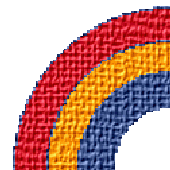
|
U.S. Poster
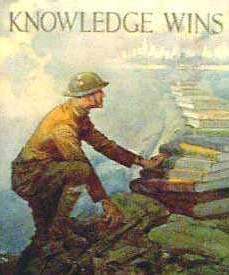
|

Goodbye, Old Pal
Goodbye, old Pal,
I've been to hell and back
again;
There's where you fell,
in mud, in blood, and rain.
Sure, we won --
you paid the bill;
You swapped your life for
that green hill;
Goodbye, old Pal.
Goodbye, old Pal.
We're sailing home,
our job is done;
But still your grave's a trench
against the Hun.
Call us back;
we'll make our stand
Where you keep guard
in No Man's Land.
Goodbye, old Pal.
Anonymous
Stars and Stripes; April 11, 1919
|
|
SEA GOING MOTHER GOOSE
Wilhelm had a little sub
He sent it out to sea,
And told it to go lie in wait
Where ships were sure to be.
It ran across the ARK one day,
We nailed it to the mast;
Poor Wilhelm hasn't many left,
He loses them so fast.
ARKLIGHT, Weekly Newspaper
USS Arkansas
|
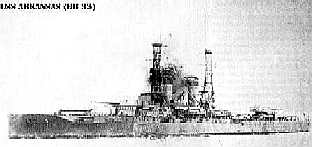
Home of Poets
|
We can't forget those dreary days
we spent in France,
Under gray and misty,
cold and dismal skies;
Those endless, crushing hikes,
along the muddy, sloppy road;
Those heavy, dragging packs:
our buddies anguish cries
We can't forget those nights lit up
by Hell's own fire,
The guns that always smashed and
crashed and pounded so:
The whirring plane that swooped and
dropped its death
Upon our wearied, hopeful pals
who trudged below.
We can't forget that though the
world laughs on, and sings,
And tries to drive war
from its memory,
That there are those who
never-more will laugh,
Nor share the pleasure of their
hard-earned victory.
|
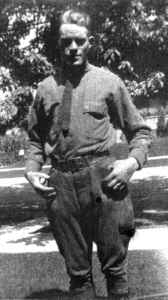
Sgt. Verner Beck of the 166th Field Artillery Brigade, through his grandniece, Mary Schaefer, has contributed a number of literary and photographic pieces to the Doughboy Center.
|
|
|
When there's a dirty job to do
The general gives out a roar
To Shove the belching big guns through --
Clear a way for the signal crew,
And that's what the doughboy's for.
He makes a front where there was no front
With grenade and bayonet,
Ripping and tearing, slashing and swearing,
Slugging in blood and sweat.
The doughboy faces the fire of hell,
Yet he dives through its smoke and grime
Sick of the reeking, pungent smell,
Cries of the hurt and crash of shell
Where life isn't worth a dime.
The general knows where the doughboy goes
A trail is being blazed
For the conquering throng
and the victor's song,
And the flag that will soon be raised.
Sgt. Verner C. Beck, 66th F.A. Brigade
|
NOVEMBER 1918
November's misty sunshine on the streets of Paris lay;
The colors of all the Allies from window and wall were gay;
There was laughter and joy in plenty, as, under the autumn sky
I saw, through the Arch of Triumph, the Stars and Stripes go by.
By a band of martial music the fluttering flag was led,
And a column of drab-clad soldiers with rapid rhythmic tread;
And the passing throng of Paris stood rigid, with eyes aflame
As under the Arch of Triumph my country's banner came.
And the hush that was on the people found echo in my breast;
It beat with a deep thanksgiving that our flag from the golden west,
In the fight for human freedom had borne so brave a share,
And wherever the wind unfurls it, the heads of men are bare;
That the lads of our drab-clad armies at Trugny and Montfaucon
On the flaming slopes of Mezy, in the hell of the deep Argonne,
Had fought with as fine a courage for the lands where the Hun had trod
As the men of the elder decades who fought for their native sod.
For now, through the misty sunshine that veiled the queenly town
The bronze men over the archway on the passing flag looked down-
The men of Lodi and Jena, and it seemed that their haughty glance
Said:
"Flag of the Great Republic, thou, too, art at home in France;
Thou has won the right in glory on the fields where
thy arms have gleamed
To stand with our own Tricolor in the
hearts of a race redeemed."
Then the martial music quickened,
and a flame on the misty sky-
From the shade of the Arch of Triumph
the Stars and Stripes went by.
Joseph Mills Hanson
Source: Our American Heritage Library
|
ROUGE BOUQUET
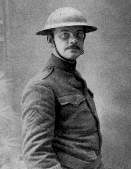
Joyce Kilmer
The best known poet
of the AEF was killed by
a sniper's bullet while
on patrol near the River
Ourcq, July 30, 1918.
Rouge Bouquet was a
wood Northeast of
Baccarat where the
42nd Division was
occupying a quiet
sector of the line.
|
|
In a wood they call the Rouge Bouquet
There is a new made grave today,
Built by never a spade nor pick
Yet covered with earth ten meters thick,
There lie many fighting men,
Dead in their youthful prime,
Never to laugh nor love again
Nor taste the summertime.
For death came flying through the air
And stopped his flight at the dugout stair
Touched his prey and left them there
Clay to Clay.
He hid their bodies stealthily
In the soil of the land they fought to free
And fled away.
Now over the grave abrupt and clear
Three volleys ring,
And perhaps their brave young spirits hear
|
|
The Bugle sings:
"Go to sleep!
Go to sleep!
Slumber well where the shells
screamed and fell.
Let your rifles rest on the muddy floor,
You will not need them any more.
Danger's past;
Now at last,
Go to sleep."
There is on earth no worthier grave
To hold the bodies of the brave
Than the place of pain and pride
Where they nobly fought and died.
Never fear but in the skies
Saints and angels stand
Watching with their holy eyes
On this new come band.
St. Michael's sword darts through the air
And touches the aureole on his hair
As he sees them stand saluting there,
His stalwart sons,
And Patrick, Bridget, Columkill
Rejoice than in veins of warriors still
The Gael's blood runs.
And up in Heaven's doorway gently
floats,
From the wood called Rouge Bouquet,
A delicate cloud of bugle notes
That softly say:
"Farewell!
Farewell!
Comrades true, born anew, peace to you!
Your souls shall be where the heroes are
And your memory shine like the
morning star.
Brave and dear,
Shield us here.
Farewell!"
Joyce Kilmer
THE RAINBOW REVEILLE [42nd Division],
June 1918.
|
MEMORIAL RAIN
For Kenneth MacLeish, 1894-1918
Ambassador Puser the ambassador
Reminds himself in French, felicitous tongue,
What these (young men no longer) like here for
In rows that once, and somewhere else, were young . . .
All night in Brussels the wind had tugged at my door:
I had heard the wind at my door and the trees strung
Taut, and to me who had never been before
In that country it was a strange wind, blowing
Steadily, stiffening the walls, the floor,
The roof of my room. I had not slept for knowing
He too, dead, was a stranger in that land
And felt beneath the earth in the wind's flowing
A tightening of roots and would not understand,
Remembering lake winds in Illinois,
That Strange wind. I had felt his bones in the sand
Listening.
Reflects that these enjoy
Their country's gratitude, that deep repose,
That peace no pain can break, no hurt destroy,
That rest, that sleep. . .
At Ghent the wind rose.
There was a smell of rain and a heavy drag
Of wind in the hedges but not as the wind blows
Over fresh water when the waves lag
Foaming and the willows huddle and it will rain;
I felt him waiting.
. . Indicates the flag
Which (may he say) nestles in Flanders plain
This little field these happy, happy dead
Have made America. . .
In the ripe grain
The wind coiled glistening, darted, fled,
Dragging its heavy body: at Waereghem
The wind coiled in the grass above his head:
Waiting--listening. . .
. . .Dedicates to them
This earth their bones have hallowed, this last gift
A grateful country. . .
Under the dry grass stem
The words are blurred, are thickened, the words sift
Confused by the rasp of the wind, by the thin grating
Of ants under the grass, the minute shift
And tumble of dusty sand separating
From dusty sand. The roots of the grass strain,
Tighten, the earth is rigid, waits -- he is waiting --
And suddenly, and all at once, the rain!
The living scatter, they run into houses, the wind
Is trampled under the rain, shakes free, is again
Trampled. The rain gathers, running in thinned
Spurts of water that ravel in the dry sand,
Seeping in the sand under the grass roots, seeping
Between crack boards of the bones of a clenched hand:
The earth relaxes, loosens; he is sleeping,
He rests, he is quiet, he sleeps in a strange land.
Captain Archibald MacLeish
|
Former ambulance driver and artilleryman, Archibald MacLeish lost his naval aviator brother Kenneth in the war. Memorial Rain was written after MacLeish attended the dedication of the Flanders Fields American Military Cemetery where his brother was buried. After the war, MacLeish became one of the most distinguished American men of letters in the 20th Century and also served as the Librarian of Congress.
|
The Silent Slain
We too, we too, descending once again
The hills of our own land, we too have heard
Far off -- Ah, que ce cor a longue haleine --
The horn of Roland in the passages of Spain,
The first, the second blast, the failing third,
And with the third turned back and climbed once more
The steep road southward, and heard faint the sound
Of swords, of horses, the disastrous war,
And crossed the dark defile at last, and found
At Roncevaux upon the darkening plain
The dead against the dead and on the silent ground
The silent slain ---
Capt. Archibald MacLeish
|
|
Body Louse aka "Cootie"
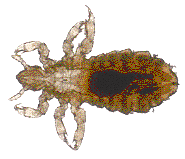
Not Actual Size
|
|
When you're standing at attention,
And the cooties duck below;
Just the way they come for seconds ,
Ain't it hell? -- Well, I'll say so!
In the lines the boys were diggin'
With their shovels to get in;
While the "cootie" rigged his digger
With his rig for diggin in.
At the front the Majors had 'em,
Every Captain raised his share;
But there sure was Hell a-poppin'
When a "buck" had one to spare.
Each and every nation has them,
Both the great ones and the small;
But for "tame" and"naughty" cooties
Rainy France, she leads them all.
Buck Private McCollum
77th Division
|
|
Hurry on, you doughboys, with your rifle and
your pack;
Bring along your cooties with your junk upon
your back;
We'll house you and delouse you and we'll douse
you in a bath,
And when the boat is ready you can take the
Western Path...
For it's home, kid, home -- when the
breakers rise and fall --
Where the khaki's hanging from a nail
against the wall --
Clean again and cheerful there --
Handin out an ear full there --
Where you never have to jump at the
bugle's call.
Lt. Grantland Rice [Yes, the sportswriter.]
Stars and Stripes; May 2, 1919
|
|
O compound of wrecked flesh, rent and torn asunder,
How do we e'er digest thy potency, I wonder --
Cold, killed cattle pounded into paste,
Pressed into tins and shipped to us in haste.
Greedily we eat thee, hot or cold or clammish,
How welcomely thou thuddest in the mess tins of
the famished.
O leavings of a jackal's feast, O carrion sublime,
No matter how we scoff at thee, we eat thee
every time.
Ah, CORNED WILLIE.
Sgt. H.W. White
Stars and Stripes, 1919
|
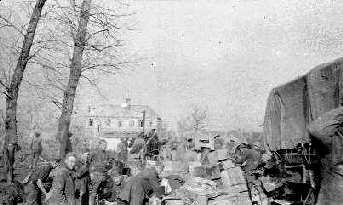
Troops (Possibly) Unloading More Corned Beef
THE RAINDROPS ON YOUR OLD TIN HAT
|
The Mist hangs low and quiet on a ragged line of hills,
There's a whispering of wind across the flat,
You'd be feeling kind of lonesome if it wasn't for one
thing
The patter of the raindrops on your old tin hat.
An' you just can't help a-figuring--sitting there alone--
About this war and hero stuff and that,
And you wonder if they haven't sort of got things twisted
up,
While the rain keeps up its patter on your old tin hat.
When you step off with the outfit to do your little bit,
You're simply doing what you're s'posed to do--
And you don't take time to figure what you gain or lose--
It's the spirit of the game that brings you through.
But back at home she's waiting, writing cheerful little
notes,
And every night she offers up a prayer,
And just keeps on a-hoping that her soldier boy is safe--
The Mother of the boy who's over there.
And, fellows, she's the hero of this great, big ugly war,
And her prayer is on the wind across the flat,
And don't you reckon it's her tears, and not the rain,
That's keeping up the patter on your old tin hat?
|
|
|
One of the most famous poems composed by a World War I Doughboy, Raindrops... was written by Lt. Wickersham the night before the St. Mihiel Offensive began. The next day, after being severely wounded by artillery fire, he continued leading his platoon despite a great loss of blood. He eventually died on the battlefield, receiving the Medal of Honor for his leadership, posthumously. His poem first appeared in Captain Billy's Whiz Bang.
|
|
To find other Doughboy Features visit our
Directory Page
|
For Great War Society
Membership Information

Click on Icon |
For further information on the events of 1914-1918
visit the homepage of
The Great War Society
|
Additions and comments on these pages may be directed to:
Michael E. Hanlon
(medwardh@hotmail.com) regarding content,
or toMike Iavarone (mikei01@execpc.com)
regarding form and function.
Original artwork & copy; © 1998-2000, The
Great War Society
|









